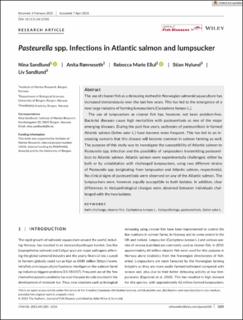Pasteurella spp. Infections in Atlantic salmon and lumpsucker
Journal article, Peer reviewed
Published version

Åpne
Permanent lenke
https://hdl.handle.net/11250/2768743Utgivelsesdato
2021Metadata
Vis full innførselSamlinger
- Department of Biological Sciences [2215]
- Registrations from Cristin [9482]
Sammendrag
The use of cleaner fish as a delousing method in Norwegian salmonid aquaculture has increased tremendously over the last few years. This has led to the emergence of a new large industry of farming lumpsuckers (Cyclopterus lumpus L.).
The use of lumpsuckers as cleaner fish has, however, not been problem-free. Bacterial diseases cause high mortalities with pasteurellosis as one of the major emerging diseases. During the past few years, outbreaks of pasteurellosis in farmed Atlantic salmon (Salmo salar L.) have become more frequent. This has led to an increasing concern that this disease will become common in salmon farming as well. The purpose of this study was to investigate the susceptibility of Atlantic salmon to Pasteurella spp. infection and the possibility of lumpsuckers transmitting pasteurellosis to Atlantic salmon. Atlantic salmon were experimentally challenged, either by bath or by cohabitation with challenged lumpsuckers, using two different strains of Pasteurella spp. (originating from lumpsucker and Atlantic salmon, respectively). No clinical signs of pasteurellosis were observed on any of the Atlantic salmon. The lumpsuckers were, however, equally susceptible to both isolates. In addition, clear differences in histopathological changes were observed between individuals challenged with the two isolates.
